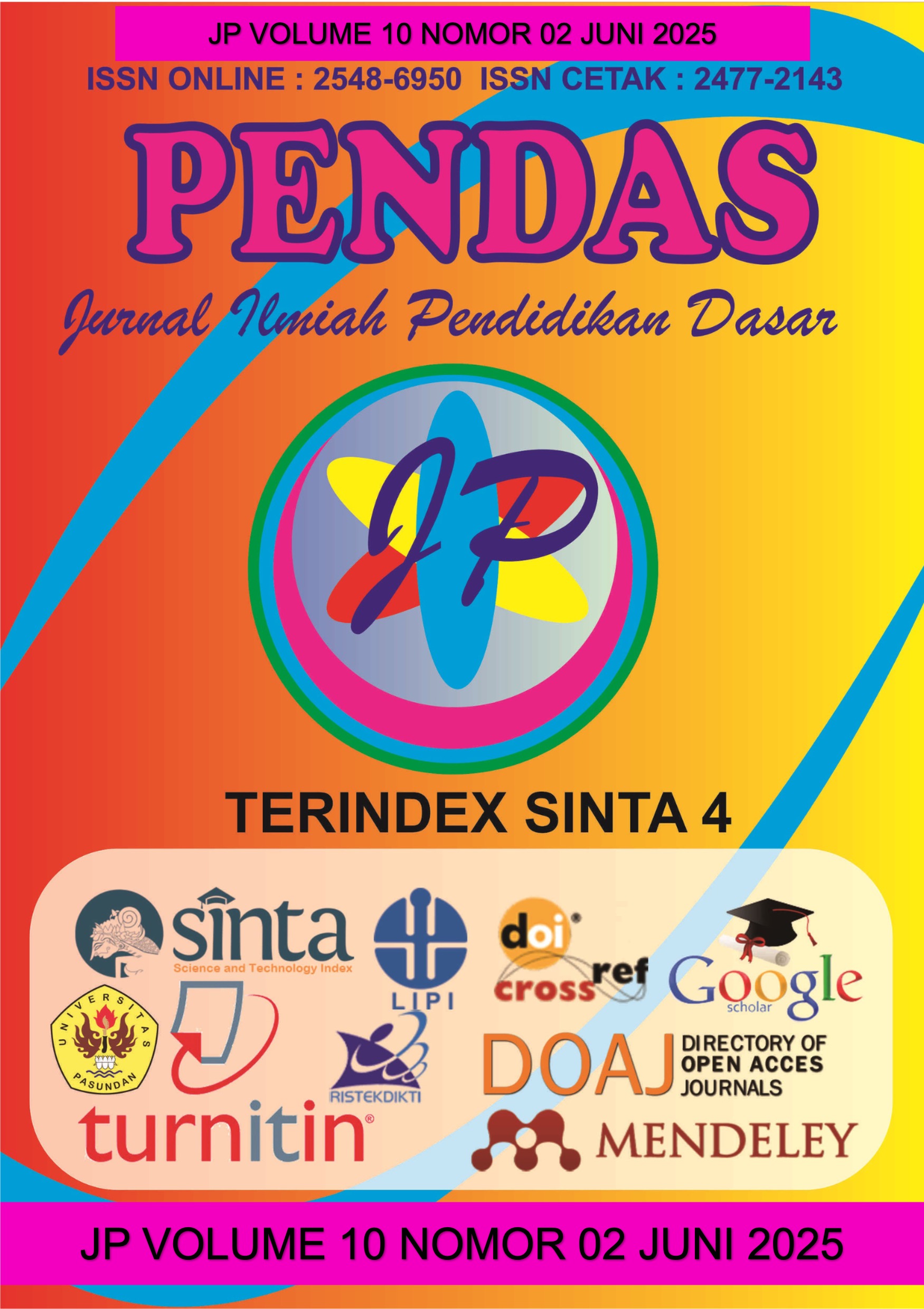Kurikulum 2013 dan Kurikulum Cinta Kemenag: Strategi Integratif dalam Pendidikan Karakter dan Spiritual
Strategi Integratif dalam Pendidikan Karakter dan Spiritual
DOI:
https://doi.org/10.23969/jp.v10i02.24768Keywords:
Character, Love Curriculum, Madrasah IbtidaiyahAbstract
This study aims to analyze the potential integration of the Love Curriculum in Islamic primary education at Madrasah Ibtidaiyah, particularly in efforts to shape students with noble character, spirituality, and environmental awareness. The background of this research relates to the challenges of globalization that influence the character and spirituality of students in Indonesia, as well as the importance of strengthening the affective and spiritual dimensions in education. Although the 2013 Curriculum has accommodated character education, the implementation of noble values is often overshadowed by a focus on academic achievement. This research uses a mixed methods approach, combining qualitative and quantitative methods to gain an in-depth understanding of teachers' readiness, understanding, and enthusiasm regarding the implementation of the Love Curriculum. The findings show that 92% of teachers agree on the importance of a love-based curriculum, although only 41% fully understand the concept. Although the Love Curriculum has not been officially implemented, values such as love for God, others, the environment, and the homeland have begun to be implicitly taught in learning. However, significant challenges remain, including the lack of official modules and training for educators, which limits the integration of these values. This study concludes that the Love Curriculum has the potential to become a transformative curriculum innovation, provided there is sufficient structural, pedagogical, and regulatory support. It is hoped that Madrasah Ibtidaiyah can become a pioneer in the implementation of this curriculum as a step toward holistic, character-based, and ecologically aware education.
Downloads
References
Anugrahsari, I., & Ismail, I. (2023). Transformasi Pendidikan Abad 21: Filsafat Pendidikan dalam Wujud Kurikulum Merdeka. Jurnal Ilmu Multidisiplin, 1(1), 10–25. https://doi.org/10.53935/jim.v1.i1.2
Fadlillah, F., Faruq, D. J., Mutmainah, S., & Ni’mah, A. A. (2023). Internalisasi Wawasan Moderasi Beragama di Kalangan Pemuda melalui Media Sosial. Pandalungan: Jurnal Pengabdian Kepada Masyarakat, 1(2), 146–153. (pemberdayaan). https://doi.org/10.62097/pandalungan.v1i2.1386
Habibah, W., Sofa, A. R., Aziz, A., Bukhori, I., & Islam, M. H. (2025). Integrasi Nilai-Nilai Al-Qur’an dan Hadits dalam Pendidikan untuk Membangun Tanggung Jawab Konservasi Alam di Madrasah Ibtidaiyah Ihyaul Islam Pakuniran. Jurnal Budi Pekerti Agama Islam, 3(1), 36–52. https://doi.org/10.61132/jbpai.v3i1.854
Hayati, M., Putri, N., & Widyawati. (2024). Implementasi Prinsip-Prinsip Islam Dalam Pembelajaran Matematika Untuk Memperkokoh Kebangkitan Spiritual Siswa. Religion : Jurnal Agama, Sosial, Dan Budaya, 3(2), 43–54. https://doi.org/10.55606/religion.v3i2.918
Jamhuri, M. (2017). Kurikulum PAI Multikultural Dalam Proses Pembelajaran Prespektif Al Qur’an. Mafhum, 2(2), 185–308.
Kemenag. (2025). Apa Kurikulum Cinta? Ini Pengertian dan Strategi Implementasinya. Diambil 30 April 2025, dari Https://kemenag.go.id website: https://kemenag.go.id/nasional/apa-kurikulum-cinta-ini-pengertian-dan-strategi-implementasinya-MKyP0
M.Ag, D. M. I., & Ph.D, Z., M. A. (2025). Pendidikan Islam 5.0: Integrasi Spiritualitas dan Teknologi di Era Disrupsi. Zahir Publishing.
Maharani, D. (2018). Pendidikan Anak Perspektif Psikologi dan Pendidikan Islam. IQ (Ilmu Al-Qur’an): Jurnal Pendidikan Islam, 1(01), 39–62. https://doi.org/10.37542/1jm5ya50
Marzuki, M., Ghifari, A., & Dirman, D. (2023). Relasi Antar Disiplin Ilmu: Paradigma Integrasi dan Interkoneksi (Transdisiplinaritas) Ilmu Pengetahuan dengan Pendidikan Islam. Al-TA’DIB: Jurnal Kajian Ilmu Kependidikan, 16(2), 99–112. https://doi.org/10.31332/atdbwv16i2.7388
Mulyana, A., Vidiati, C., Danarahmanto, P. A., Agussalim, A., Apriani, W., Fiansi, F., … Martono, S. M. (2024). METODE PENELITIAN KUALITATIF. Penerbit Widina.
Munir, K., Salminawati, & Usiono. (2025). Pendidikan Islam dalam Perspektif World Conferences on Muslim Education: Tela’ah Ontologis, Epistemologis, dan Aksiologis. Didaktika: Jurnal Kependidikan, 14(1 Februari), 925–940. https://doi.org/10.58230/27454312.1843
Naila, S., Asiah, S., & Ifendi, M. (2025). Dinamika Pendidikan Islam di Era Reformasi: Dari Tradisional ke Modern. JURNAL ILMU PENDIDIKAN & SOSIAL (SINOVA), 3(1), 029–038. https://doi.org/10.71382/sinova.v3i1.226
Noventue, R., Ginanjar, S., & Astutik, A. (2024). Hakikat Pendidikan: Menginternalisasikan Budaya Melalui Filsafat Ki Hajar Dewantara Dan Nilai-Nilai Pancasila Pada Siswa. Jurnal Review Pendidikan Dan Pengajaran, 7(1), 2809–2818. https://doi.org/10.31004/jrpp.v7i1.25898
Rofik, R. (2015). Nilai Pembelajaran Sejarah Kebudayaan Islam Dalam Kurikulum Madrasah. Jurnal Pendidikan Agama Islam, 12(1), 15–30. https://doi.org/10.14421/jpai.2015.121-02
Sariman, Huda, C., & Afif, M. N. (2021). Pengembangan Mutu Peserta Didik dalam Pembelajaran: Implementasi Profesionalisme Guru Madrasah. Jurnal Pendidikan Agama Islam Al-Thariqah, 6(2), 317–341. https://doi.org/10.25299/al-thariqah.2021.vol6(2).7425
Sulianti, A., Safitri, R. M., & Gunawan, Y. (2019). Implementasi Pendidikan Kewarganegaraan Berbasis Kearifan Lokal dalam Membangun Karakter Generasi Muda Bangsa. Integralistik, 30(2), 100–106. https://doi.org/10.15294/integralistik.v30i2.20871
Sunaryati, T., Subekti, W. U., Lukito, A. N., Sari, W. P., & Asih, E. (2024). Analisis Pengembangan Pembelajaran Terpadu Berbasis Kearifan Lokal Guna Meningkatkan Daya Kognitif Dan Perkembangan Karakter Siswa Di Sekolah Dasar. Jurnal Ilmu Pendidikan dan Pembelajaran, 6(4). Diambil dari https://journalpedia.com/1/index.php/jipp/article/view/3312
Downloads
Published
Issue
Section
License
Copyright (c) 2025 Pendas : Jurnal Ilmiah Pendidikan Dasar

This work is licensed under a Creative Commons Attribution 4.0 International License.














































